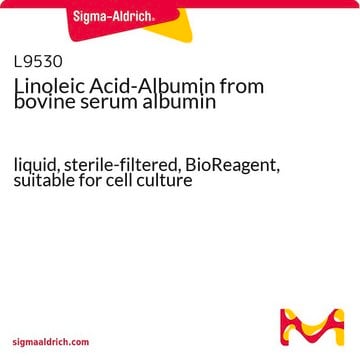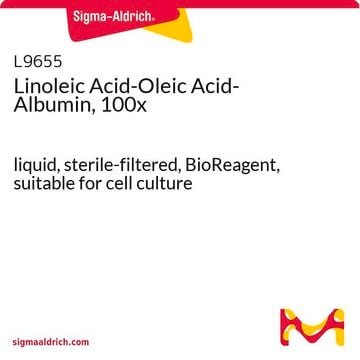L1012
Linoleic acid
liquid, BioReagent, suitable for cell culture
Synonym(s):
cis-9,cis-12-Octadecadienoic acid
About This Item
Recommended Products
biological source
plant (Safflower oil)
Quality Level
product line
BioReagent
Assay
≥98%
form
liquid
technique(s)
cell culture | mammalian: suitable
refractive index
n20/D 1.466 (lit.)
bp
229-230 °C/16 mmHg (lit.)
mp
−5 °C (lit.)
solubility
NaOH: 1 M
ethanol: soluble
density
0.902 g/mL at 25 °C (lit.)
storage temp.
−20°C
SMILES string
OC(CCCCCCC/C=C\C/C=C\CCCCC)=O
InChI
1S/C18H32O2/c1-2-3-4-5-6-7-8-9-10-11-12-13-14-15-16-17-18(19)20/h6-7,9-10H,2-5,8,11-17H2,1H3,(H,19,20)/b7-6-,10-9-
InChI key
OYHQOLUKZRVURQ-HZJYTTRNSA-N
Gene Information
human ... SOAT1(6646) , SOAT2(8435)
Looking for similar products? Visit Product Comparison Guide
General description
Application
Biochem/physiol Actions
Packaging
Storage Class Code
10 - Combustible liquids
WGK
WGK 1
Flash Point(F)
Not applicable
Flash Point(C)
Not applicable
Personal Protective Equipment
Choose from one of the most recent versions:
Certificates of Analysis (COA)
Don't see the Right Version?
If you require a particular version, you can look up a specific certificate by the Lot or Batch number.
Already Own This Product?
Find documentation for the products that you have recently purchased in the Document Library.
Customers Also Viewed
Articles
Lipid Induced Insulin Resistance
Protocols
Discover our primary human hepatocytes and plating and maintenance media formulations. Explore our protocol for plateable primary hepatocyte cell culture.
Discover our protocol for thawing, plating, and forming hepatocyte spheroids from human spheroid-qualified plateable hepatocytes. Find the formulation for hepatocyte spheroid maintenance media.
Related Content
Explore our protocol for suspension primary hepatocyte cell culture. Discover our primary human hepatocytes and plating and maintenance media formulations.
Our team of scientists has experience in all areas of research including Life Science, Material Science, Chemical Synthesis, Chromatography, Analytical and many others.
Contact Technical Service










